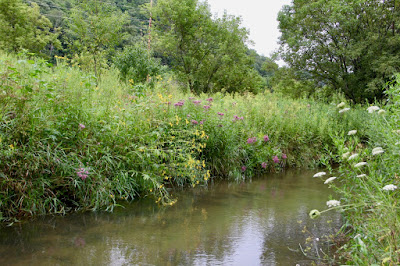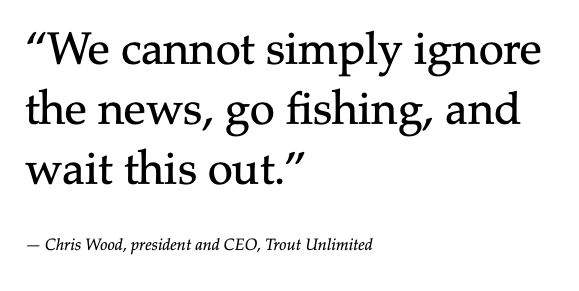 |
| Driftless Area trout stream
Photo by J. Harrington
|
I've been a member of Trout Unlimited [TU] most or all of my adult life. At one time I served as editor of the local chapter's newsletter. More recently I've been impressed and encouraged by the amount and type of outreach TU has been undertaking to engage more women and families with conservation and fishing. Now, today, I'm heartened by the lead story in the TU national newsletter that starts with this quotation:

"We’ve learned that conservation is ultimately about people engaging people in the protection of the lands and waters that sustain us — all of us together.
"But across America, many of our communities are hurting. Inequities and violence undermine the basic bonds that unite us as a nation. This should trigger rigorous introspection. Introspection about what we can do as an organization to become more welcoming to more of America—what we can do to become more inclusive and more equitable.
"Good comes when we listen more, understand more, and judge less — when we seek compassion and ways to help our neighbors. Good comes from building an America that truly protects the rights and freedoms of all its people.
"Inequity and violence destroy. When we build community, we create."I admit that I sometimes get frustrated by what I've seen as TU's something less than aggressive approach to conservation and "protecting the resource." On the other hand, I know I can benefit from learning to "understand more, and judge less." I'm learning that a more aggressive perspective might serve in the near term but may not be as suitable for the long game. Ethics, properly demonstrated, and taught, discussed, and internalized are essential, in part because we cannot now, and never will be able to, hire enough cops to be in all the places necessary to enforce all the laws and other rules we think others need to follow. And, looking at the myriad reports of police brutality being caught on video this past week, having too many cops looks to create way more, and more serious, problems than too many cooks.
 |
| Aldo Leopold's "The Shack"
Photo by J. Harrington
|
For almost as long as I've been involved in TU, I've know about and studied The Land Ethic espoused by Aldo Leopold in his classic A Sand County Almanac.
Leopold did not define the land ethic with a litany of rights and wrongs in A Sand County Almanac. Instead, he presented it as a set of values that naturally grew out of his lifetime of experiences in the outdoors. Leopold wrote that “we can only be ethical in relation to something we can see, understand, feel, love, or otherwise have faith in.”How hard can it be for each of us to reach out to those we live, work, and play with to get them to "see, understand, feel, love, or otherwise have faith in" our lands, waters, and, each other? Shall we try to find out?
Speckled Trout
By Ron Rash
Water-flesh gleamed like mica:orange fins, red flankspots, a charshy as ginseng, found onlyin spring-flow gaps, the thin clearof faraway creeks no mapcould name. My cousin showed methose hidden places. I lovedhow we found them, the way wefollowed no trail, just stream-soundtangled in rhododendron,to where slow water openeda hole to slip a line in,and lift as from a well brightshadows of another world,held in my hand, their coloralready starting to fade.
********************************************
Thanks for visiting. Come again when you can.
Please be kind to each other while you can.
No comments:
Post a Comment